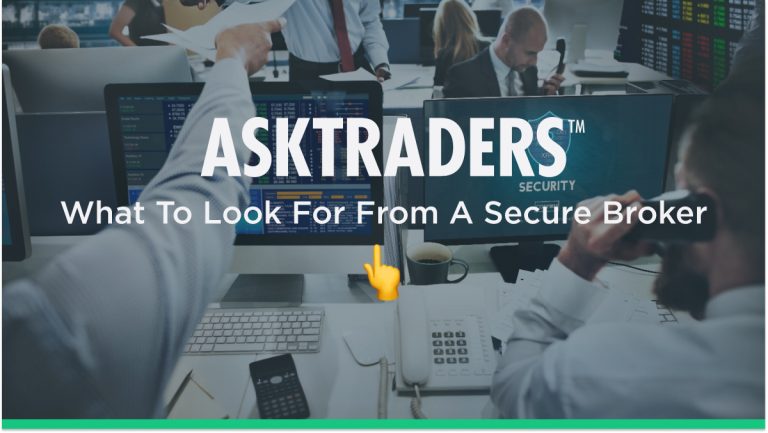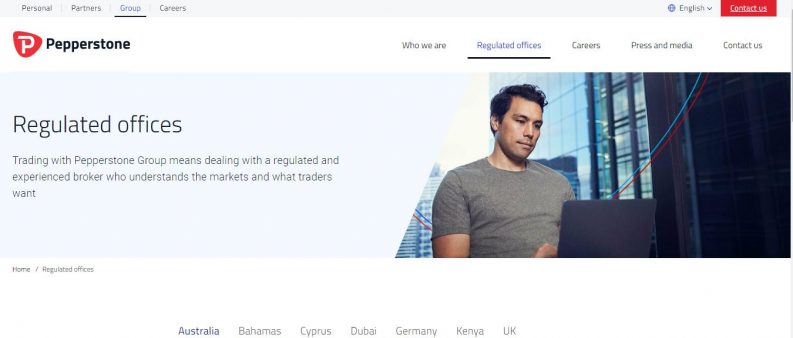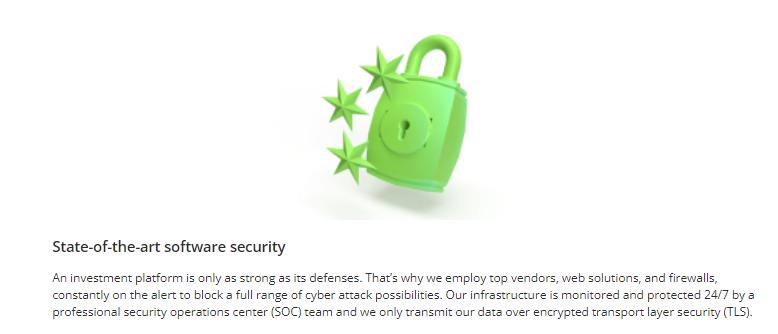
What to Look For From A Secure Broker
- Broker Regulation
- What Is A Tier-1 Regulator?
- How to Know if a Broker is Regulated
- Why Do Some Brokers Set Up With Non-Tier-1 Regulators?
- Business Fundamentals
- Stock Exchange Listing
- Cybersecurity
- Top Tips To Make Your Trading Secure
Broker Regulation
One of the easiest and most reliable ways to grade the security offered by a brokerage firm is to establish which financial regulator licenses the business. An immediate red flag is if a broker is unregulated. If that is the case, they are almost certainly a scam and operating a scheme where unsuspecting traders sign up with them and never see their money again.
Brokers that are regulated must comply with a range of rules and regulations designed to protect clients' interests. These usually include the segregation of funds, which means client funds are held in a different bank account to those of the firm. That means if the broker goes bust, your funds are safe.
One of the most important benefits of using well-regulated brokers means they have to comply with anti-money-laundering laws (AML). Accounts are monitored to establish unusual patterns of behaviour; for example, a dormant account suddenly sees an increase in the number of withdrawals. AML laws are also designed to prevent brokers from paying funds to another account. Instead, money paid into a brokerage account must be returned to the account from which it originally came.
Another element of client protection is provided by the hoops that brokers have to jump through to get the licence in the first place and to keep it valid. The process of gaining a licence from a regulator such as the FCA is costly. It takes time and money to produce the policies and procedures a regulator requires of its member firms, and brokers also have to provide regular updates, which adds to the cost base.
The regulator will expect to receive reports on the management team at the broker to ensure they are fit and appropriate. The broker's financial statements will be scrutinised to ensure they are a going concern. Client complaints will also be monitored. Disputes with a broker need to be raised with it in the first instance. However, those unhappy with any proposed resolution can raise it with the regulator to see if intervention from the authority is appropriate.
What Is A Tier-1 Regulator?
Different regulators require different things from the firms they authorise. The regulators that are most demanding of the brokers they license adopt industry best practices and are considered Tier-1 regulators. Brokers considering gaining a licence from a Tier-1 regulator like those listed below can expect to jump through higher hoops and face higher costs.
- The US Securities and Exchange Commission (SEC)
- The Financial Conduct Authority (FCA)
- The Australian Securities and Investments Commission (ASIC)
- The Cyprus Securities and Exchange Commission (CySEC)
How to Know if a Broker is Regulated
Regulated brokers must place a disclosure notice on their website's home page. It will include details of the licence number at the regulator, the firm's full name, and registered address. One solid check to run on any firm is the disclosure usually found at the bottom of the home page. The below example taken from the Pepperstone site is what to look out for.
“Pepperstone Limited is a limited company registered in England & Wales under Company Number 08965105 and is authorised and regulated by the Financial Conduct Authority (Registration Number 684312). Registered office: 70 Gracechurch Street, London EC3V 0HR, United Kingdom.”
Source: Pepperstone
Given how hard it is to gain authorisation and its importance to clients, good brokers unsurprisingly promote their security and often have a section of their platform dedicated to offering more information on their regulatory status.

Source: Pepperstone
To get around the problem of online sites falsely claiming to be regulated, it's possible to cross-reference the broker's credentials at a regulator's register of licensed companies, which is the golden source of information. The FCA's Financial Services Register of bona fide firms can be found here.
While checking the disclaimer notice, you may also want to consider a vital statistic that all regulated brokers must share. The generic text used is “X% lose money”. The success rate of each broker will depend on a variety of factors, and many of them will be related to the actions of the clients. Nevertheless, an example of these types of disclaimers can be found below. It is taken from IG and is in line with the market standard presentation of risk information provided by good brokers.
“Spread bets and CFDs are complex instruments and come with a high risk of losing money rapidly due to leverage. 71% of retail investor accounts lose money when trading spread bets and CFDs with this provider. You should consider whether you understand how spread bets and CFDs work, and whether you can afford to take the high risk of losing your money. Professional clients can lose more than they deposit. All trading involves risk.”
Source: IG
If your broker is a global operation that supports clients worldwide, the decision on which regulatory body you will fall under will depend on where you live. AvaTrade, for example, is licensed as a regulated broker in the EU, Japan, Australia, South Africa, UAE and the British Virgin Islands. As a result, AvaTrade has a reputation for being well-regulated. Still, clients need to check the small print to verify which one of those regulators will be overseeing their account.
Why Do Some Brokers Set Up With Non-Tier 1 Regulators?
All traders should be looking out for the rubber stamp of a Tier-1 regulator. Brokers that don't aim to be Tier-1 regulated may be regulated by a Tier-2 authority for various reasons. One is cost, and some brokerage firms start off being regulated by Tier-2 and upgrade to Tier-1 later. Another is that some Tier-2 and Tier-3 regulators take a benign view of certain areas of trading.
The FCA and CySEC, for example, prohibit the use of Deposit Bonus Offers where brokers offer clients some kind of hard to pin down cash incentive to open an account. Other regulators are more relaxed about maximum leverage terms, but with FCA and CySEC offering leverage up to 1:30, that is more than enough for most traders. Given the risks of using leverage, the restraint provided by Tier-1 regulators can easily be claimed to be in the interest of traders.
Grading regulators into Tiers isn't an exact science. Even the Tier-1 regulators will differ slightly in how they approach a particular issue. The most effective approach which allows you to sleep at night and instead focus on your trading and investments is to ensure your broker is Tier-1 regulated.
Business Fundamentals
A second helpful guide to the health of a broker is the business fundamentals and trading history. For example, the broker eToro has grown to host more than 20m account holders, and the broker IG has been in operation since 1974 when it first started trading as IG Index.
Both of these point to the firms have developed a successful business model. The high-profile track records also mean they are sensitive to reputational risk. With complaints able to go viral on social media, better brokers can be expected to ensure client needs are met.
Bad news can travel fast, and the reduction in client numbers suffered by the US broker Robinhood in 2021 can be partly attributed to disgruntlement in the trading community when the platform suspended trading in meme stocks in Q1 of 2021.
Stock Exchange Listing
Broker platforms can be subdivided into privately owned or listed on a stock exchange. Both approaches have pros and cons, but brokers with publicly listed shares are generally agreed to be more secure.
That is because exchanges such as the London Stock Exchange require firms to meet additional requirements. Reports to investors on the firm's health need to be audited and provided to investors regularly. Governance protocols will also need to be maintained, and a certain percentage of the firm's total equity must be available to the public to ensure individuals cannot have too much sway over the management of the firm.

Source: eToro
Cybersecurity
The damage caused by cybercrime has been increasing exponentially. It reached around $4.2bn in 2020, which only includes damages from reported cases. The online broking industry is exposed as much as any other to the risk of attack by cybercriminals. Checking its approach to the issue is an essential part of the due diligence process for new investors.
One continuing debate is whether brokers who host their own servers are safer than those who use third-party providers. On the one hand, the responsibility for security falls on people with a vested interest in it being maintained. On the other hand, cloud-style firms specialise in one line of work, third party hosting, to dedicate their time and effort to do the best job possible.
Most brokers offer a breakdown of the IT protocols they follow. The below is from the eToro site and provides a good benchmark for what your broker should be providing regarding cybersecurity on cash transfers.
“Depositing money into your eToro account via any means is absolutely safe, private and secure. All transactions are communicated using Secure Socket Layer (SSL) technology, ensuring that your personal information is kept safe.
Depositing funds into your eToro account using eToro Money is secure and fast, with your cash funds safeguarded in a regulated bank account.”
Source: eToro
Client-side risks can also be managed. eToro, for example, provides two-factor authentication (2FA) for its clients logging on to the platform and the need to pick up a code sent to a mobile phone makes client accounts that little bit more secure.
Top Tips To Make Your Trading Secure
Opening a demo account is a great way to test out a broker. They take moments to set up and usually require little more than an email address but allow you through to the trading platform so you can really kick the tyres.
Demo accounts allow you to test and develop new strategies in a risk-free environment. When you've tried a few different brokers, you will have gone a long way to finding the best broker for your needs; you'll have also carried out your own ‘sniff test' on the different platforms.
One risk management option not offered by all brokers is the option to open an account which supports trading in small size. This can be particularly useful for new traders, and the Cent account at FXTM allows newbies to open an account with as little as $5. That means new clients can take a considered approach towards scaling up their trading and test the broker further before committing substantial funds.
With client safety being such a hot topic, some firms are pushing boundaries on what they offer their clients, and there are always new deals to look out for. One example is the additional insurance eToro offers its clients. They receive coverage of up to one million euros, GBP, or AUD (depending on the region). The insurance is given automatically to all eToro clients. There is no need to register. It is activated in the unlikely instance of eToro suffering losses due to the unlikely event of eToro's insolvency and in the case of Event of Misconduct (as defined in the applicable Policy).
Final Thoughts
Given the amount of time some investors spend researching the markets, there can be a disconnect in relation to the time spent researching brokers. Whether you are new to investing or an experienced trader, it is essential to check the small print and know what red flags to look for.
One shortcut to finding a trusted broker is to head to this list of good brokers that the AskTraders team has reviewed. The review process takes a rounded approach and considers pricing, customer service and research materials on offer. Different brokers take a different approach to each of these topics, but one deal-breaker is the level of regulation, and only genuine firms are included on that shortlist.
